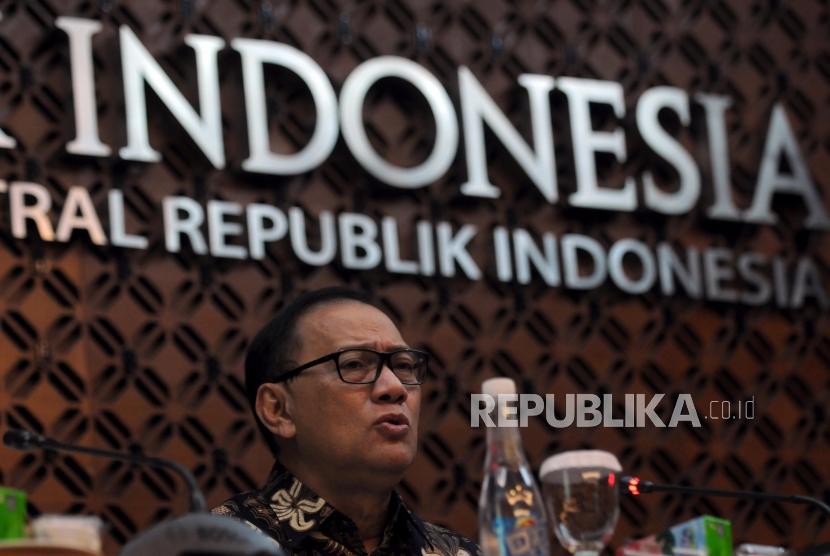REPUBLIKA.CO.ID, JAKARTA -- Bank Indonesia is expected to finally bow to pressure to raise its benchmark interest rate after rupiah lost more value against the U.S. dollar. Governor of the Central Bank Agus Martowardojo has indicated it would raise its "7-Day Reverse Repo Rate" after the national currency sank deeper to below its fundamental level.
"Bank Indonesia has wide room for the adjustment of its 7 Days Reverse Repo," Agus said here on Friday.
Agus said the rupiah fall in the past several weeks is no longer in line the country's economic fundamental condition.
The Central Bank is set and consistent to take a monetary policy that would create economic stability, he said. "Response to adjustment of interest rate will be given consistently and pre-emptive to ensure sustainable stability," he said.
Earlier on Wednesday night Agus said the Central Bank was preparing a firm monetary policy including adjustment of "7-day Reverse Repo Rate" amid the rupiah depreciation of 3.44 percent until May 8 2018 (year to date).
Also read: Govt backs BI to intervene in rupiah's exchange rate
Agus said the global economic challenge is growing including the U.S. raising its interest rate, oil price hike and growing risks of geopolitics as a result of the growing tension of the trade war between the two world largest economies the United States and China and the U.S. withdrawal from its nuclear agreement with Iran.
From 1-9 May , 2018, rupiah weakened 1.2 percent(month to date), Thai Bath lost 1.76 percent (mtd), and Turkish Lira 5.27 percent (mtd). From Jan. 1 to May 9 this year, Rupiah weakened 3.67 percent (year to date), Philippine peso 4.04 percent (ytd), Indian Rupee 5.6 percent (ytd), Brazil's Real 7.9 (ytd), Russian Rubel 8.84 (ytd), and Turkish Lira 11.42 (ytd).
Agus also said the Central Bank will remain consistent in maintaining the market mechanism to run effectively and efficiently to guarantee liquidity in the foreign exchange market and in the money market.
"Monetary operation in the foreign exchange market will continue to minimize volatility of exchange rate.Monetary operation will also continue in the money market to ensure rupiah liquidity and to maintain stability in interest rate on the market," he said.
The present Bank Indonesia benchmark interest of 4.25 percent has not been changed in nine consecutive months. The central Bank has refused to raise its benchmark interest rate despite calls from a number of leading economists for readjustment to U.S. dollar appreciation lately.
On Wednesday, head of the Public Policy and Economic Study Center (PSEKP) of the Gadjah Mada University (UGM), A. Tony Prasetiantono said Bank Indonesia needs to immediately raise its benchmark interest rate to prevent rupiah from sinking deeper against the U.S. dollar.
Tony said currently almost all countries have put behind the era of low interest rate, adding unless immediately responded to the condition the country's foreign exchange reserve would be depleted soon.
He said Bank Indonesia could raise the interest rate, by 25 or 50 basis points, describing the condition as alarming psychologically that needs serious addressing. "The market tends to see the situation similar to condition in 1998 although Indonesia still fares better than many other countries," he said.
On Tuesday, economist Bhima Yudhistira from the Institute for Development of Economic and Financial (INDEF) called on the central bank to raise its benchmark interest rate "7-Day Reverse Repo Rate" to prevent foreign capital flight.
Bank Indonesia may not rely only on the foreign exchange reserve as an instrument," Bhima said. He said Bank Indonesia still has room to raise its benchmark interest rate by 25-50 basis point from the present level of 4.25 percent.
By the end of March, 2018, the country's foreign exchange reserve was US$126 billion or 2.06 percent smaller than it was in the previous month.
On Monday, Senior Deputy Governor of the Central Bank Mirza Adityaswara said the falling value of the national currency in the past several week was only temporary.
"Rupiah has continued to weaken, but it would not crash as in 2013, as the country had succeeded in keeping the macro economic indicators well under control such as inflation and at the same time the government has continued to launch deregulation measures," Mirza said
The main cause of the volatility of the currency is the policy of the U.S. central bank, The Federal Reserve, which raised its benchmark interest rate (Fund Rate) last March and still plans to gradually raise the Fund Rate two more times this year.
The next meeting of Bank Indonesia Board of Governors would be on May 16-17 when the Central Bank leaders are expected to decide on a new benchmark interest rate. The meeting would also be the last for retiring Agus Martowardojo, who will be replaced by his deputy Governor Perry Warjiyo on 24 May, 2018.


